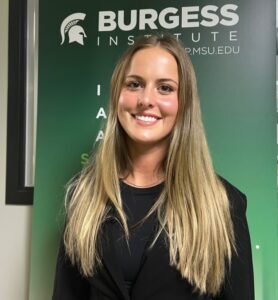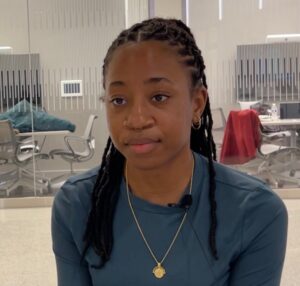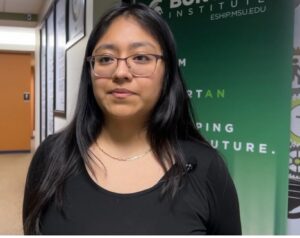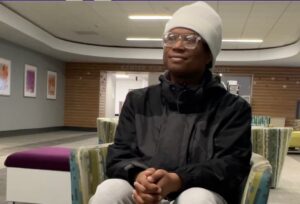Where Young Voters Get Their News First — and What They Do Next
Editor’s note: This is the first in a two-part series on young voters’ views and use of media. Read part two on young voters’ recommendations for mainstream outlets.
In the electoral battleground of Michigan, young voters in the College Town of Ingham County are poised to play a pivotal role in the 2024 election. The sources youth use to stay informed about news could have a big impact on their votes this fall.
In this community that’s home to Michigan State University, young people said they use social media first to stay up to date on what’s happening, consistent with a 2019 Pew Research Center study in which more than 40% of Americans aged 18-29 said social media was their primary source of news. Then, youth interviewed for this story go to mainstream media and Google to verify what they find suspect. This overlaps with ACM Digital Library’s research in 2023, revealing that young people’s news search habits rely on “Good Enough Reasoning.”
“For participants, having ‘good enough’ information meant knowing enough to win an argument (e.g., with a parent or on Twitter), learning enough about a topic to feel confident talking with friends about it, or understanding enough to avoid making a mistake or sounding out-of-the-loop,” according to the article “Practicing Information Sensibility: How Gen Z Engages with Online Information.” The article pointed out: “Few participant information journeys ended with a definitive ‘true’ or ‘false’ answer.”
Youth Media Habits: Nine Vignettes
Here nine young voters in Ingham County open up about where and how they consume news and information, including how they verify accuracy and their social and mainstream media habits. The students interviewed also share the issues they care about most and their upcoming voting plans.
- Video: How Young Voters in Michigan Consume News on Social and Mainstream Media
- Video: More on Young Voters’ Mainstream Media Concerns and How Mainstream Media Could Change
- Video: Young Voters on Media Bias and Suggestions for Mainstream Media

As Eva Medill, 23, an MSU senior in interdisciplinary studies who plans to vote in East Lansing in November, summed up, “I get most of my information through social media.” She frequently logs on to social media apps, such as Facebook, Instagram, X (formerly Twitter), and TikTok, via her phone, where she gets regular updates on human rights issues, refugee and immigration policies, genocide, water sanitation, and sustainability. Medill shares information on X and TikTok with her network about every two weeks, and sometimes makes comments there. However, she finds not everyone is fully educated about what they’re talking about on social media, she said.
So Medill then goes to NPR as a reliable source for verification. She also uses Google search; governmental websites; and sites that end with .org, .net, or .edu to verify information. She stays away from websites ending with dot com.
Liam Richichi, 20, a junior in political theory and business at MSU, said he scans news on Instagram, X, or Tik Tok. However, he prefers mainstream media for political news. “Social media can be very misleading a lot of the time,” he said.
Richichi, vice president of the College Democrats at MSU, is registered to vote in Lansing this year and been voting since he turned 18. For him, important issues are LGBTQ rights, abortion, and the accessibility and affordability of higher education.
Richichi uses Apple News on his phone, accessing articles online from CNN, Fox News, ABC, and NBC. For local news, he goes to Lansing State Journal and The State News. Most of the time, Richichi likes reading articles because he can digest the news at his own speed.
“When I see something interesting on social media, I go to mainstream media to double check. Also, I do research on Google,” he said. Richichi also uses PolitiFact to verify information going viral on TikTok.
On Instagram, he sometimes shares facts on how to register to vote, places and times to vote, and candidates’ biographies. “I want more people to get involved in the election,” he said.

Kyle Armbruster, 18, a freshman at Michigan State University, said he uses X to get current information, but finds similar challenges. “It’s hard to know how credible it is, if you can trust it or not,” he said, adding that he doesn’t publicly share info on social media; he just messages his friends and family.
When Armbruster thinks something on social media is fabricated, he goes to mainstream media to check, preferring to read stories online rather than watch TV. His main sources are Fox News, The New York Times, and Detroit Free Press. “I tend to find credible articles, so I can keep up with candidates that I want to learn more about,” he said. His parents also send him articles about topics they’re interested in.
Armbruster, a Detroit native, plans to vote on campus for the first time and is particularly concerned about economic issues, including inflation and jobs.

Elena Bradley Moorer, 21, a third-year student in social studies education at MSU, plans to vote on campus as she has done previously. She usually checks social media, including X and TikTok, for the latest updates. This way, she can keep up with candidates and policies she supports. Her top interests range and include education, economics, environmental policy, politics, history, and international affairs.
Social media can be inconsistent, Moorer said, so she fact-checks to ensure that the news is not fabricated or AI-generated. For this, she uses mainstream media and governmental websites. She turns to The New York Times the most where she has a subscription. She also goes to CNN, MSNBC, NBC, and The Washington Post. “I do a lot to verify information. I prefer to use mainstream media,” she said.
Moorer favors reading articles, having grown up reading many newspapers. She also likes watching videos if they are engaging or more convenient when she’s multitasking.
Moorer said she shares more on X than on TikTok, but she does not write her own posts. Rather, she retweets posts on issues she cares about, mainly about education and politics, usually twice or three times a week to show her support for specific policies.

Yesica Juarez, 23, who’s earning a master’s in social work at MSU, said she’s inclined to look at TikTok to see what’s new on various topics. Juarez plans to vote in Ingham County this fall after establishing residency here. She is attracted to the immigration issue because her family is from Mexico.
She finds information on TikTok to be “50/50 true,” she said. “I would say I prefer social media for updating, but I know it’s not always reliable.”
Then, she goes to Google to see if the news is correct and offers different perspectives on specific topics. In addition, Juarez uses an app of WLNS-TV 6 for news in nearby communities.
Juarez shares news with her social networks on issues happening in the U.S and other countries every few weeks. She mainly uploads posts from others to story on Instagram, then reposts on TikTok.

Nam Phan, 22, a Vietnamese American who recently graduated from MSU, said he uses X, Threads, and sometimes Reddit to find news on his interests. “But I find that many things can become exaggerated on social media,” he said.
Phan has seen lot of misinformation or false articles on X, especially in 2020, targeting presidential candidates. He guesses posters want to entice people click on their posts.
He follows several issues that affect him and his family, including student loan forgiveness. Phan, a resident of Holt, plans to vote via absentee ballot as he has done since 2020.
To verify information, Phan said he goes to mainstream media outlets, including The Washington Post and The New York Times, and uses Google search as well as .org and .edu websites. “I usually click on the article from Google, and then I’ll read the articles there and see if they confirm what I saw on social media,” he said.
Phan prefers to read articles rather than consume news in other formats. But if videos supplement articles, he will watch them. He rarely shares election information on social media because he believes his friends are knowledgeable on when and where to vote. He only shared information on story on Instagram when President Biden announced his student loan forgiveness plan in 2023, which triggered a robust discussion with his friends.

Michael Singler, 22, a nursing student at Lansing Community College, enjoys using social media, including TikTok and Instagram, because it’s compact. “On social media, people don’t double check their information, just go with whatever everyone else says,” he said. For that reason, he does his research on Google on specific topics, then looks at websites that end with .org or .edu for accurate information. “I check different articles and different perspectives to come to my own conclusion on specific issues,” he said.
Singler cares about infrastructure issues and future policies that benefit local communities, and said he plans to vote in person in Lansing.

Aidon Brion, 18, a first-year economics student at Lansing Community College, said X is one of his primary sources. “However, I am skeptical about important pieces of information or breaking news on social media,” he said. Brion is “pretty excited” that he can vote for the first time this year and plans to vote on campus or in the East Lansing area, he said.
Brion was absorbed in fiscal policy before the election. He said government spending and overall government debt are among the country’s biggest problems. “Depending on the kind of information, I choose different formats, such as videos or podcasts of politicians speaking about their policy,” he said.
For example, he said he would go to the Federal Reserve Bank website to check for interest rate updates. When it comes to court rulings, like the overturning of Roe v. Wade, Brion likes to read physical documents that explain what and why the court reached that ruling.
In addition, Brion uses the app Ground News, which collects news across the political spectrum. He usually chooses news articles that are considered neutral.
Brion said he shares information on X and expresses his political opinions, but his posts are not connected to his name. From what he has seen in the past five years, if people express their opinion, and it doesn’t follow the mainstream view, they can be ostracized or labeled as a bad person or other labels that probably don’t define them, he said.

Allie Dearman, 25, who hails from Lansing and now studies in Dallas, Texas, said she likes going to TikTok and Instagram first to watch short videos on issues she cares about, including women’s rights, immigration laws, and extending the retirement age. Dearman is registered to vote in Lansing and plans to vote this year.
When Dearman is involved in women’s advocacy on domestic and sexual abuse, she shares this information on story on Instagram to spread awareness to people in her network. “I don’t post regularly, just once a month,” she said.
Like her peers, Dearman said she worries about misinformation on social media. “Since people have a platform, they could spread misinformation, and it spreads like wildfire. And I’ve seen that happen before and it’s scary,” she said.
To verify information, Dearman goes to Google. This leads her to different news outlets, including CNN, The New York Times, Fox News, and Daily Mail. In addition, Dearman talks with her father and her aunt, who are very involved in politics.
This is part of a series of posts from students at the Michigan State University Journalism School. The students will be covering four counties around Michigan during the 2024 campaign for the Detroit Free Press working with the American Communities Project typology.
